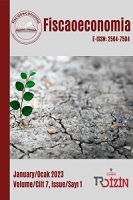Türkiye’de Mali Alanı Kısıtlayan Faktörlerin Belirlenmesi ve İncelenmesi
Identification and examination of the factors limiting the fiscal space in Turkey
Author(s): Fatin Şevki BULUT, Serkan CuraSubject(s): National Economy, Economic policy, Public Finances, Fiscal Politics / Budgeting
Published by: Ahmet Arif Eren
Keywords: National Policy Space; Fiscal Space; Fiscal Policy; Turkish Economy;
Summary/Abstract: Fiscal space is a derivative concept that started to be mentioned in the texts of international organizations during the crisis years of mainstream economic thought. The concept of fiscal space, which has been frequently mentioned in the texts of international organizations since its first use in 2005, has been presented as a policy proposal for developed and developing countries. The crisis of confidence in international institutions brought about by the economic crises after the non- interventional policy years after the oil crisis has been influential in the introduction of the concept of fiscal space into the literature on the axis of the Post Washington Consensus. There is no clarity yet on the definition and use of the fiscal space. There are definitions and uses of heterodox economics that emphasize the ability of countries to create an independent policy space, as well as uses that prioritize debt sustainability in accordance with the ideas of mainstream economics. Fiscal space was initially described as a concept that measures the possibility of resources that countries can allocate from the state budget to public services such as education, health and infrastructure investments without disturbing their public financial indicators. In the following years, this concept has acquired various meanings such as debt sustainability, the state's room for maneuvering against crises, and the economic policy independence of countries against the proposals of austerity measures by international organizations. In this study, fiscal space constraints in the Turkish economy for the period 1990-2020 were examined in the light of the indicators categorized as the Sustainability of Government Debt, State Budget, Balance of Payments and Market Perception. The public crises of the 90s were transferred to the private sector in the 2000s, which resulted in a relative relief in Turkey's public sector indicators. Although Turkey is experiencing an improvement in the general balance of the public sector, it cannot use the fiscal space it has acquired for the purposes of creating the fiscal space, as it is constantly faced with the risk of socialization of existing risks. There are two main sources of the mentioned risks. These are treasury-recognised debt assumption guarantees and private sector external indebtedness.
Journal: Fiscaoeconomia
- Issue Year: 7/2023
- Issue No: 1
- Page Range: 568-605
- Page Count: 38
- Language: Turkish

